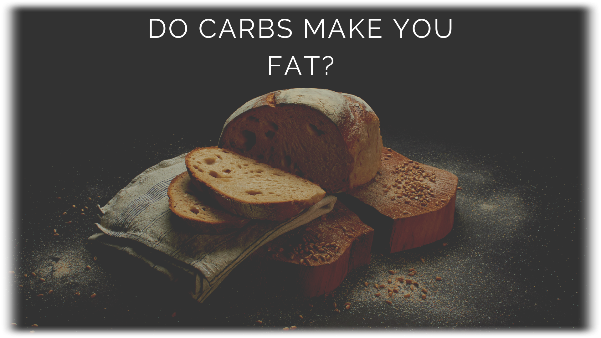|
There’s a lot of stigma surrounding carbohydrates and their role in fat-gain. Undeservedly so. I say that because as of right now, there’s no evidence to suggest that a specific dietary approach or macronutrient split (proportion of carbohydrates, fats, and protein) is optimal for fat-loss. And it’s hard to say we ever will have that evidence available to us, for a couple of reasons. First, we’re all physiologically different - our bodies operate uniquely. The same dietary approach can elicit a different physiological response in two unique individuals. Secondly, even with physiological differences aside, to carry out a study to figure it all out would require continued maintenance & assessment of the participants diet across their lifetime.. it just wouldn’t be physically possible. So, to come to the conclusion that a certain macronutrient split dictates fat-gain or fat-loss is a little naive & certainly ungrounded in science. Not quite convinced enough to sway from the low-carb camp? Well, let’s keep going. What's Really Causing Fat-Gain?Carbohydrates are actually pretty essential for optimal functioning - perhaps just not the carbohydrates you’re thinking of. I’m talking about vegetables - carbohydrate sources stacked full of vitamins & minerals that our bodies desperately need. Is over-consumption of vegetables at the crux of our modern obesity pandemic? Somehow, I doubt it. Clearly, it’s not carbohydrates driving fat-gain, it’s overconsumption - particularly of refined carbohydrates. Refined carbohydrates are essentially calorie-dense, nutritionally empty foods. They negatively affect our microbiome (which influences our mood among other things), trigger dips in energy and activate our reward system - leaving us craving for more. Once we take these out of the diet - which a low carb typically does - it’s only natural to see an improvement in fat-loss, because it becomes easier to eat less. Like many other dietary approaches, low-carb can be an effective method for certain individuals to maintain a calorie deficit & therefore achieve fat-loss. But let’s be very clear: it’s the energy balance, not the low-carbs, that is driving fat-loss. Therefore, a low-carb approach isn’t essential for fat-loss. But, what is near essential is lifestyle changes that permit for ease of calorie control. Sleep, stress, mindset and activity all play a role here, but for the sake of this piece I’m going to solely talk about what you can do nutritionally speaking. Fueling for Calorie Control1) Avoid refined carbs & processed foods as much as possible.
These foods negatively affect our microbiome (gut bacteria), which in-turn has so many downstream effects, whether it be our mood, energy levels, or how we hungry we feel. If like myself, you struggle with a severe sweet tooth, try an alternate day approach; only indulge in a sugary snack every other day. Of course, this relies on you not simply eating twice the amount on the on-days.. Processed foods also typically have a more-ish tendency to them - and its not by mistake. Often, these 'foods' are stacked full of sugar or sweeteners that have genuinely addictive properties. It's pretty easy to get through a packet of cookies or a whole tub of ice-cream. Trust me I've been there. These processed goods aren't too problematic in small amounts, but it can be a real challenge to manage consumption of them. My best advice would be to just not buy them in the first place - out of sight, out of mind. 2) Eat Real Food Consume real food that satiates you & that gives your body the nutrients & minerals it needs. We’re talking vegetables. Loads of them. Get yourself the highest quality meat that your budget allows for - visit your local butchers if you’ve got that option available to you. Throw plenty of fruit in the mix too - berries are always a good shout. Fueling your body with real, high-quality foods has the opposite effect of processed products. These help maintain a healthy & diverse microbiome. When our microbiome is in good health, our mood typically improves considerably. This is important, because how we feel internally can often be a precursor to the behaviours we engage in. Just think about, how many times have you turned to a sugary or unhealthy snack in a time of discomfort or stress? 3) Consume Consciously Be conscious of your consumption. When you sit down for a meal, before eating just take a minute to breathe & relax. Doing so helps relax the nervous system, primes the body for digestion and get us in touch with our body. Chew your food. Studies have actually shown that an increase in the number of times we chew our food is correlated with reduced feelings of self-reported hunger. The actual act of chewing has hormonal effects that influence our satiety & appetite, leading to reduced intake. Try not to over-eat. It’s tough when living in a culture of excess & where more is always regarded as better. But, we really don’t need to eat as much as we think we do. A practice I like to try & employ is stopping at around the 80% full mark... a tough one I know. But, you’ll often find that about 15-20 minutes later you’re actually more full than you thought you were. Rather than just mindlessly stuffing your face, try to be a bit more present, chew your food properly & take breaks between mouthfuls, appreciate what you're eating. This conscious practice helps build greater awareness of your level of fullness & can actually be quite cathartic. The message behind all this is to simply consume in a way that will make you feel good in the long-term. We live in a society of excessive consumption, but that doesn't mean you have to allow it to shape you. Keep an eye out for your future-self, they’ll be grateful. |
Author
Christian Lawal Personal Training.
Personal training in Tunbridge Wells, Tonbridge & Sevenoaks. Archives
January 2024
|

